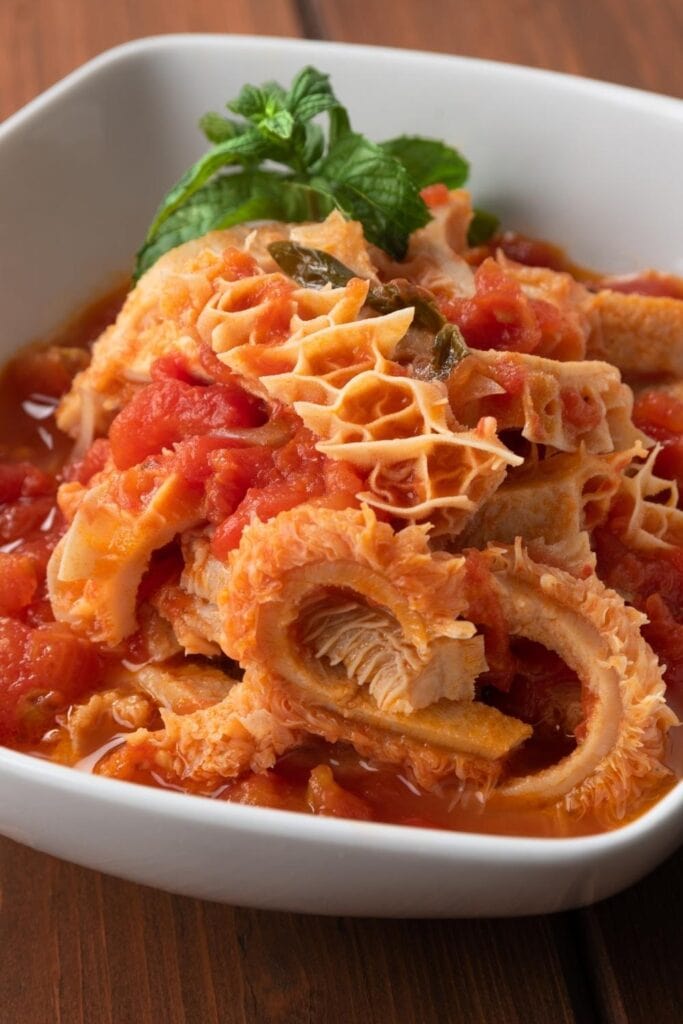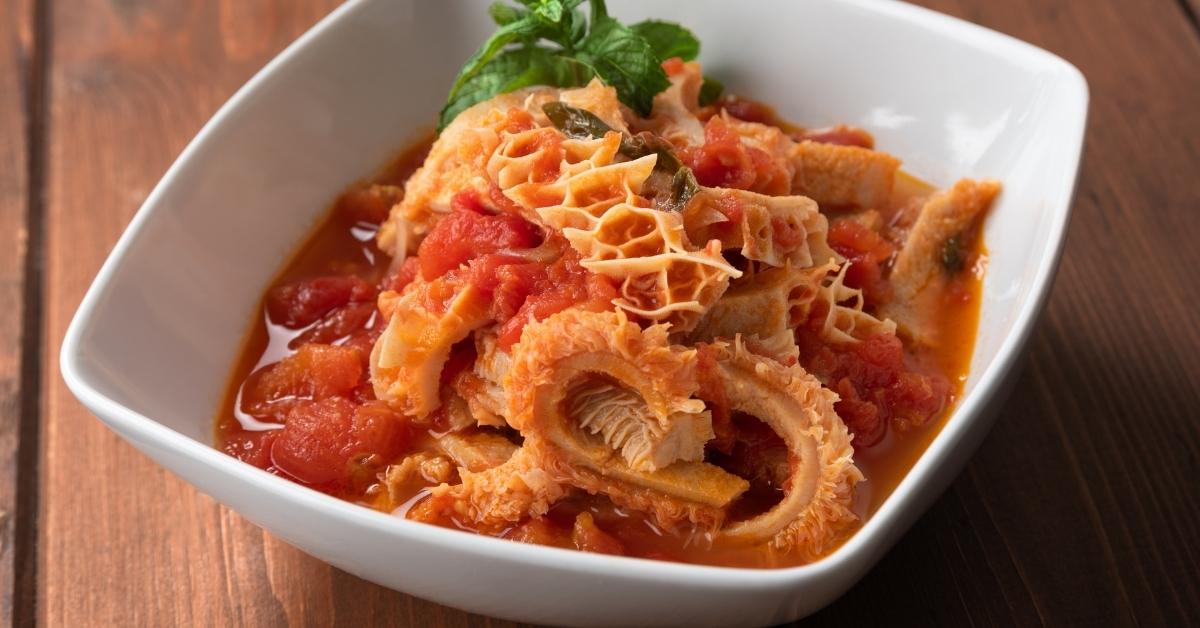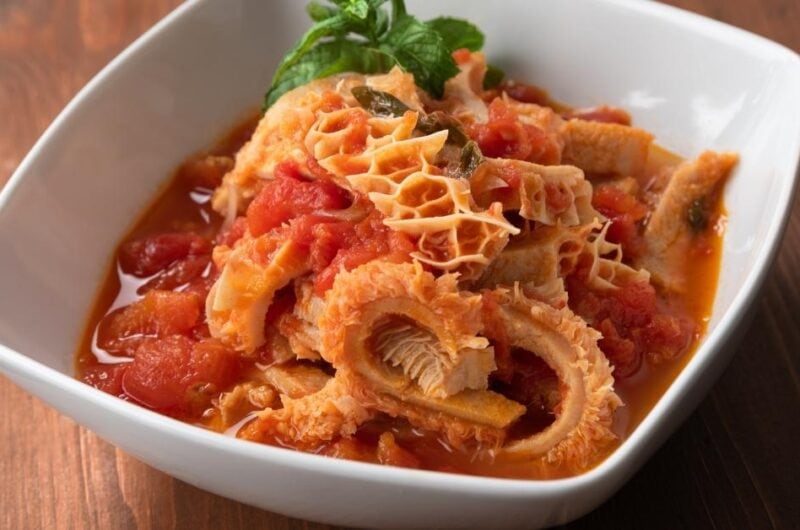Are you looking for something new and unique to add to your repertoire? Then check out these tripe recipes!
Tripe is a meat that most people overlook, and I have no idea why!
Okay, I do know why.

People get a little weirded out by the thought of tripe.
Tripe comes from the stomachs of cows, sheep, and other farm animals. That turns some people off.
It really shouldn’t, though. It has a chewy texture and is both delicious and nutritious. It’s even considered a delicacy in many countries!
Plus, there are plenty of ways to prepare it. These ten tripe recipes can give you a few ideas to start.
1. Trippa Alla Romana: Roman Style Tripe in Tomato Sauce
Trippa Alla Romana, or Roman-style tripe, is a delectable Italian dish.
It features chewy and tender tripe braised slowly in a rich, flavorful tomato sauce.
It tastes like one of the best pasta dishes you’ve ever tried. (Which is interesting since it doesn’t actually contain any pasta.)
The texture of the honeycomb tripe is very pasta-esque, however.
That, along with the tomato sauce, herbs, and spices, screams ‘Italian pasta dish.’
Be sure to top it with plenty of parmesan and serve it with crunchy, crusty bread.
It’s an exquisite dish ideal for cold fall or winter nights.
2. Beef and Tripe Pochero
Do you love Latin food? If so, you’ll love this beef and tripe pochero recipe. Pochero is a traditional dish from the Andalusia region of Spain.
And when I say it’s packed full of flavor, I’m not exaggerating. This dish is perfect when you want a rich, filling meal.
It pairs beef chuck with ox tripe, Chinese sausage, and hearty potatoes. It’s the most chunky of chunky stews.
It’s sure to leave you feeling satisfied and full all night long.
3. Kare Kare
The ingredients list for kare kare looks like someone’s bizarre grocery list.
There are banana hearts, peanut butter, eggplant, ox tripe, oxtail, garlic, and more.
None of that stuff seems like it should go together, I know. But this slow-cooked Filipino stew makes it work.
It’s magnificent, and there’s a reason so many people love it.
It’s a classic, and you can easily customize the recipe.
It’s a savory, slightly nutty, earthy meal that’s unlike anything you’ve ever tried.
4. Dim Sum Tripe Stew
If you enjoy Asian food, you’ve likely tried dim sum. But have you ever tried dim sum tripe stew? Now’s your chance!
Dim sum is a type of Chinese cuisine. It usually consists of small dumplings or pieces of food served in small steamer baskets.
This recipe uses honeycomb beef tripe, ginger, scallions, and daikon radishes. It’s simple to make and perfect for a warm evening meal.
It’s spicy and full of chunky goodness. Every bite gives you a new flavor to experience.
You’ll also love the interesting textures and various sauces in the recipe.
And hey, if you don’t tell anyone they’re eating tripe, they might not even know!
After all, honeycomb tripe really does look like a honeycomb. That could be what they think it is.
5. Tripe Soup (Ciorbă de Burta)
This earthy, tangy, garlicky soup is the perfect example of why I love tripe. It’s creamy and rich with a delightfully buttery broth.
(Even though the recipe doesn’t call for any butter!)
It’s full of veggies and garlic and has a ton of flavor. I can’t lie, it takes some time to whip up.
Luckily, most of that isn’t hands-on time.
Once you get the ingredients boiling, you can pretty much leave them to do their thing.
6. Dominican Style Tripe Stew (Mondongo)
Here’s another incredibly hearty stew that’s ideal for winter. Even if you’ve never had it, it’s comfort food at its finest.
Sipping on this robust, chunky stew feels like coming home.
It features wildly flavorful ingredients like scallions, cilantro, red peppers, and more.
The broth isn’t thick and creamy. Instead, it’s a relatively thin, light, bright tomato-based broth.
However, the chunky bits more than make up for the thin broth.
Plus, all the veggies give you a massive dose of vitamins and nutrients. That means it’s just as nutritious as it is delicious.
7. Menudo Soup
Mexican Menudo soup is a traditional dish from Mexico.
Most people make it with beef stomach, onion, garlic, and marrow bones.
It has a delicious and unique flavor that you’ll love. Plus, it’s healthy and hearty enough to satisfy your hunger.
It’s a little spicy but not too hot and is often used as a hangover cure in Mexico.
It’s a low-carb, extremely high-protein soup with tons of vitamin B.
Traditionally, it also includes hominy in the ingredients list.
This particular recipe doesn’t ask for hominy. However, you can add it if you like.
Just be sure you drain the hominy well and wait until the end of the process to add it.
8. Caribbean Beef Tripe Soup
If you need a low-carb soup option, this one isn’t it. Thanks to the plantains and flour dumplings, the carb count is a bit high.
However, the soup also has a ton of flavor. It’s a brothy, vegetable-packed soup with lots of chunky ingredients.
The tripe is tender and chewy and takes on the flavors of all the seasonings in the soup.
It takes a couple of hours to make, but it’s an easy process. The result is well worth the effort, too.
9. Callos
Callos is a classic Spanish dish. Usually, it’s made with beef tripe, pork blood, and collagen-rich leg meat.
This recipe uses more accessible ingredients.
You’ll still find beef tripe in the ingredients list. However, tomato sauce, beef broth, and pork and beans replace the pork blood.
Typically, callos is slow-cooked for hours until it’s tender and flavorful.
This recipe is a simplified version you can make in under 2 hours.
Best of all, it still has the same depth of flavor as the traditional dish.
Whip it up the next time the weather turns cool enough for warm soup.
10. Trippa alla Fiorentina
This Italian dish is similar to the Trippa Alla Romana one above.
However, this one features tripe cooked in the traditional Florentine way instead.
The robust, garlicky tomato sauce is just the same, however. It has plenty of herbs and seasonings and a bright, zest taste.
You’ll also want to top it with parmesan or Parmigiano-Romano. The crusty, crunchy bread is another similarity.
Basically, if you like the Romana recipe above, you’ll love this one, too.
(And vice versa, of course.)











